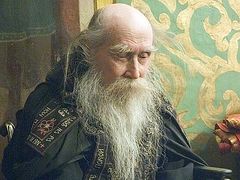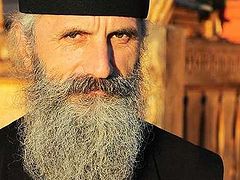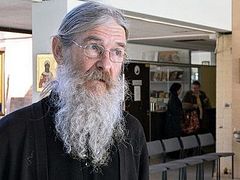On two feasts in a row—the Nativity of the Mother of God and the Exaltation of the Honorable Cross of the Lord—Liturgy was served in our monastery by some dear guests from Greece: the abbot of the Monastery of the Prophet Elijah on the island of Hydra Archimandrite Theologos, a resident of the same monastery Hieromonk Hierotheos, and a cleric of a church on the island of Aegina, Archpriest Nicholas Savvopoulos, a well-known theologian in Greece.
Fr. Theologos met and spoke with St. Paisios the Athonite many times. He even wrote down an entire notebook of his sayings and wants to publish these notes. He lived not far from the Elder and often visited him, sat, and simply looked at St. Paisios, at how he spoke with people. Geronda promised to bring these notebooks and read the Elder’s words to the sisters on his next trip to Ukraine.
During one of Geronda Theologos’ visits, he addressed the sisters with a brief word of instruction, which we would like to share with the readers of our site.
 Geronda Theologos and Ionian Archimandrite Athanasius
Geronda Theologos and Ionian Archimandrite Athanasius
According to the tradition of Holy Mount Athos, when a monk is asked to say a word, he should never speak from himself, but from his elder. Therefore, I will tell you what Geronda says, who taught monks and nuns, to whom 300 nuns confessed.
In the monastery, we have to kill three snakes that are constantly trying to bite us.
The first snake is our “own rightness,” the “personal rightness” of each of us. For some reason we think that if we live in a monastery for fifteen years, then we already have the right to give a word or do something ourselves, as if we don’t have to humble ourselves; we think we have to humble others, namely who are younger than us. And if something has to be done, then let someone who just came to the monastery do it.
But everyone, no matter how long they have lived in the monastery, should try to live in the same disposition with which they arrived—that is, to remain in the spirit of a new novice.
Let us recall Abba Poemen of Egypt, who was always asked why he, living in a coenobium, lived like a hermit. And he would answer that when he first came to the monastery, he saw a donkey tied up at the gates of the monastery and said to himself: “Poemen, no matter how long you live in the monastery, always have as much of your own rightness as has this donkey at the gates.” And St. Seraphim of Sarov would say that you should live your entire life, as long as you’re in the monastery, like a dove—with the same simplicity.
The second snake that constantly bites us is envy. And when it bites, it steals absolutely everything—all our labors. Therefore, as soon as there is even a hint of the manifestation of envy, you must immediately expel it from yourself with great speed.
In the beginning, when we begin to fight with this passion, it torments us greatly, deep down inside; but when we drive it out of our mind, the Lord grants great inner joy.
And the third snake that bikes monks is suspiciousness and rivalry. “Why should I do that instead of someone else?” This is a huge problem in a monastery. When St. Eupraxia was fighting with such a passion, she took up the very lowest work in order to get rid of discontent, so that the question, “Why me?” wouldn’t even arise.
We have to humble ourselves and live so that those close to us would be able to rest as much as possible thanks to our help.
If I see a sister laboring, I hurry to help her, so she could rest—this is how every nun should be. And not like this: “I did my work, let her do hers.”
***
Holy Ephraim of Katounakia spoke about how we should bear our obedience with the feeling that our elder is the visible God.
He also said that if we lose our relationship with God, then our elder can restore this relationship by his prayers. But if we spoil our relationship with our elder, who will help us restore good relations with Him? Therefore, we must honor our elder.
He also said that no matter what business we have started, we must always think: “By the prayers of my spiritual father (be sure to use his name), Lord, have mercy upon me!” and then get to work. Thus, there comes humility—it’s not that I did something, but everything worked out by the prayers of my elder. And when we say this, our respect for our spiritual father and abbot grows more and more.
***
I wish you to rejoice in the monastic life that you are living—that the Lord would give you joy, because the monastic life is a life of incessant spiritual joy.
Elder Gregory would say that a monk should literally burst with spiritual joy; he should be overflowing with spiritual joy.
Therefore, I wish that your whole life would be filled with this joy. And I hope that when we pass from this life to the Kingdom of God, we will meet the Light of Christ, as Elder Porphyrios said, so that our death would not be something terrible, but as though we were simply opening the door to another room.
***
We are very glad to have come here. We have seen many pleasant and unexpected things here. We met true brethren in Christ. We thank you from our whole hearts! We also thank the apostle Andrew the First-Called and Sts. Cyril and Methodius, who were the enlighteners of the Slavs, that by their labors we now have such brethren as the Slavic peoples in our family of Orthodox Christians.





